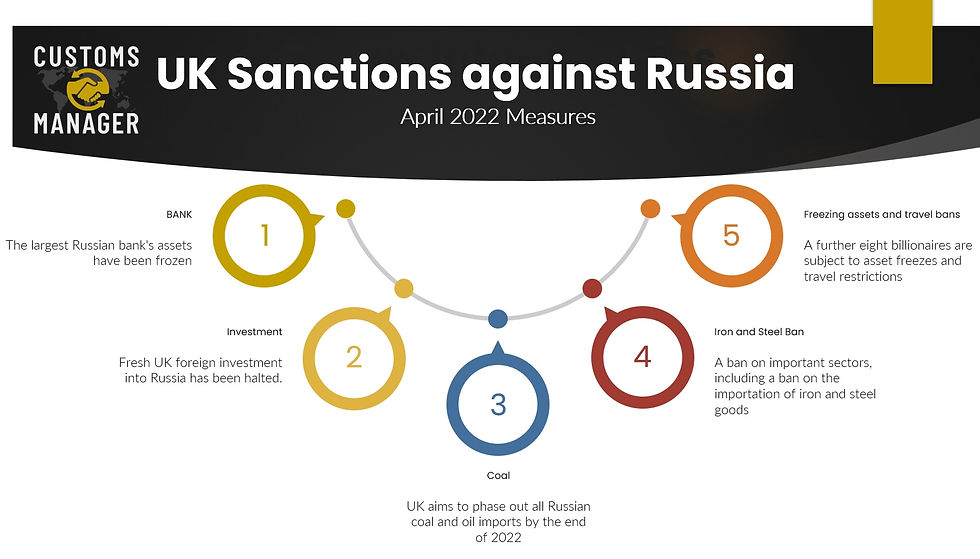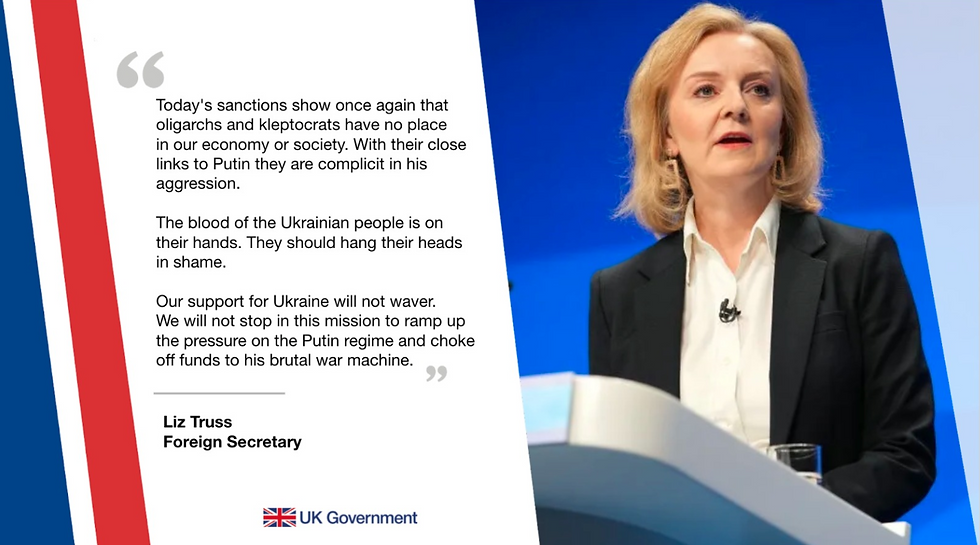Russia Sanctions: What Every Global Trade Professional Should Know
- Arne Mielken
- Apr 17, 2022
- 7 min read
A presentation of the legal obligations imposed by the UK Sanctions Rules and Regulations, including a webinar hosted by the Sanctions authorities.
Introduction
The United Kingdom has imposed sanctions against Russian firms and individuals because of the country’s involvement in an ex-spy’s poisoning, the occupation of Crimea and its involvement in the military conflict in Ukraine, to name but a few.
In 2022, there has been a wide range of rounds of measures, including freezing the assets of Russians, most of whom are government officials, as well as Russian companies and two other firms based elsewhere but which have ties to Russia.
This post will discuss UK legal analysis on Russian sanctions, along with associated information that may be useful to Customs and Global Trade professionals.
It is expected that additional sanctions against Russia will occur over time; therefore, legal information related to current sanctions should be used as a starting point when planning future operations involving imports or exports of goods from or into Russia.
Key Facts
The UK imposes a wide range of sanctions against Russia, certain Russian entities and organisations. Businesses must ensure they do not trade with sanctioned individuals or entities or organisations.
The UK has been instrumental in drafting EU sanctions against Russia following its annexation of Crimea.
Since Brexit, the UK has drafted its own sanctions law. In addition to provisions aimed at restricting trade with Crimea, these sanctions target individuals and entities involved in violating Ukraine’s territorial integrity and sovereignty or who are contributing to instability in Ukraine.
These measures also restrict new arms sales to Russia.
Summary of UK Sanction's Regulations against Russia
You should also review the following regulations to find out any changes made to the Regulations:
the Sanctions (EU Exit) (Miscellaneous Amendments) (No. 2) Regulations 2020
the Sanctions (EU Exit) (Miscellaneous Amendments) (No. 4) Regulations 2020
the Russia (Sanctions) (EU Exit) (Amendment) Regulations 2022
the Russia (Sanctions) (EU Exit) (Amendment) (No. 2) Regulations 2022
the Russia (Sanctions) (EU Exit) (Amendment) (No. 3) Regulations 2022
the Russia (Sanctions) (EU Exit) (Amendment) (No. 4) Regulations 2022
the Russia (Sanctions) (EU Exit) (Amendment) (No. 5) Regulations 2022
the Russia (Sanctions) (EU Exit) (Amendment) (No. 6) Regulations 2022
the Russia (Sanctions) (EU Exit) (Amendment) (No. 7) Regulations 2022
the Russia (Sanctions) (EU Exit) (Amendment) (No. 8) Regulations 2022
See here for direct access: https://www.gov.uk/government/collections/uk-sanctions-on-russia
The first 2022 amendment sought to broaden the "Designation criterion" and include more meanings. The Second Amendment focuses on financial constraints.
Main elements of the Russia (Sanctions) (EU Exit) (Amendment) (No. 3) Regulations 2022.
The sanctions comprise a list of critical-industry products and technology that are currently prohibited from export, supply, transfer, or use in Russia, as well as the provision of related technical assistance, financial services, and brokering services.
Existing limitations on the export, supply, or transfer of military and dual-use equipment, as well as on the export or supply of energy-related goods and services, remain in force.
There are several exceptions to these limitations, which are detailed in the statute, and licences can only be given in extremely specific circumstances.
The full details of the new measures, which augment the sanctions measures introduced in 2014, can be found in Russia (Sanctions) (EU Exit) (Amendment) (No. 3) Regulations 2022.
Main elements of the Russia (Sanctions) (EU Exit) (Amendment) (No. 4) Regulations 2022.
Amendment No. 4 examines shipping sanctions.
Main elements of the Russia (Sanctions) (EU Exit) (Amendment) (No. 5) Regulations 2022.
Amendment No. 5 examines financial and investment constraints.
Main elements of the Russia (Sanctions) (EU Exit) (Amendment) (No. 6) Regulations 2022.
Amendment No. 6 addresses new aviation and trade restrictions.
Webinar delivered on 17.03.2022 delivered by Gov.UK
Return to a webinar to learn more about the scope of UK sanctions and financial restrictions:
Those who watch this will hear from the following government departments on these topics:
Measures Task Force and the Foreign Commonwealth and Development Office have agreed on the scope of the sanctions.
ECJU financial Sanctions: limits and general licences - HM Treasury Office of Financial Sanctions Implementation (OFSI)
Export Support Service Ukraine / Russia - Department for International
Trade trade sanctions enforcement - HM Revenue and Customs
Main elements of the Russia (Sanctions) (EU Exit) (Amendment) (No. 7) Regulations 2022.

The Regulations expand the current Crimean banking, maritime, and trade restrictions to the non-government held territories of Ukraine's Donetsk and Luhansk oblasts.
The necessary exclusions and licencing rules are also extended to the non-government controlled territories of the Donetsk and Luhansk oblasts by the Regulations. The exception's cut-off date remains December 20, 2014, for contracts relating to Crimea, and February 23, 2022, for contracts relating to non-government-controlled territories of the Donetsk and Luhansk oblasts.
According to the law, designated people are those who fit a specific description. Persons identified by description, like those designated by name, may be barred from entering the United Kingdom and subject to financial restrictions, such as having their cash or economic resources blocked, or to shipping or aircraft sanctions.
The Regulations forbid the giving of technical assistance pertaining to aeroplanes and ships to or for the benefit of a specified person. This includes the authority to designate individuals for the purposes of such penalty, as well as related exclusions and licencing rules.
The Regulations also make changes to allow a licence to be issued to allow the movement of aircraft that would otherwise be prohibited; to suspend rather than simply revoke permission; third, to ensure the exception for acts done for the purposes of national security or the prevention of serious crime applies to prohibitions in and under the rules for aircraft, too; and fourth, to amend the penalties for offences) to ensure that each offence for ships is covered.
Presentation by Customs Manager on the Russian Sanctions (12.04.2022)
Returning to a basic presentation on Russian sanctions given to ACITA on April 12, 2022. This is the voice of international commerce in the United Kingdom, serving as a focal point and platform for traders and consultants active in cross-border trading. Download it here.
Main elements of the Russia (Sanctions) (EU Exit) (Amendment) (No. 8) Regulations 2022.

New trade restrictions are introduced in connection to equipment and technology for oil refining (as specified in new Schedule 2D), quantum computing, as well as sophisticated materials and technologies (as specified in new Schedule 2E), luxury items (as defined under the new Schedule 3A), and items made of iron and steel (as specified in new Schedule 3B). The items mentioned in new Schedules 2D, 3A, and 3B are identified by reference to commodity codes found in the United Kingdom Tariff. By amending Part 7 of the 2019 Regulations, Regulations 5, 6, and 7 allow for licensure and exemptions from the new requirements. Regulations 8 and 9 provide adjustments to the enforcement provisions in Parts 9 and 10 of the 2019 Regulations.
Please visit: https://www.legislation.gov.uk/uksi/2022/452/note/made
Access the Schedule: https://www.legislation.gov.uk/uksi/2022/452/schedule/made
More about "Designations" - What are they and how do they work

The UK may designate those who are or have been active in destabilising Ukraine, as well as undermining or endangering Ukraine's territorial integrity, sovereignty, or independence. Designated individuals may be barred from entering the United Kingdom and subject to financial sanctions, including having their cash or economic resources frozen.
Since the invasion of Russia into Ukraine in 2022, the UK has sanctioned more than 300 of Russia's most prominent and high-value persons, businesses, and subsidiaries, with over 500 of them being included in the UK's sanctions list. For example, in the context of the Russian war against Ukraine, this includes members of the Russian Duma and Federation Council who voted to recognise the independence of Donetsk and Luhansk in flagrant violation of Ukraine’s territorial sovereignty.
Examples of prominent UK sanctioned persons include
Roman Abramovich is the owner of Chelsea Football Club and holds investments in steel companies Evraz and Norilsk Nickel.
En+ Group is owned by nickel tycoon Oleg Deripaska.
Rosneft's Chief Executive Officer is Igor Sechin.
VTB bank's Chairman is Andrey Kostin.
Alexei Miller is the CEO of the Russian energy firm Gazprom.
Transneft, Russia's state-owned pipeline enterprise, is led by Nikolai Tokarev.
Bank Rossiya's Chairman of the Board of Directors is Dmitri Lebedev.
Gennady Timchenko, Russia’s sixth-richest oligarch
Boris and Igor Rotenberg, 2 long-standing associates of the regime.
For the list of designated persons, please see here:
The UK has been at the forefront of this effort, shutting out large proportions of whole sectors of the Russian economy, such as its defence industry, its financial institutions and its transport sector.
What do I need to know about Asset Freezes?
An asset freeze prohibits any UK citizen or business in the UK from engaging with any funds or economic resources owned, possessed, or controlled by the designated person and kept in the UK. It will also prohibit finances or economic resources from being supplied to or for the advantage of the designated individual. This means that if you are holding money or stock from a designated person, you cannot return it to the owner.
For example, in the Russian war against Ukraine in 2022, the assets of 5 Russian banks involved in bankrolling the Russian occupation were frozen. This includes
Bank Rossiya, which is particularly close to the Kremlin,
Black Sea Bank for Development and Reconstruction,
IS Bank and
Genbank.
The assets of Promsvyazbank, the pivotal bank in propping up Russia’s defence sector, have also been frozen.
There is more guidance on Asset Freezes and what to do here:
Travel bans
UK Sanctions usually include a travel ban. This means that the designated person must be refused leave to enter or to remain in the United Kingdom, providing the individual to be an excluded person under section 8B of the Immigration Act 1971.
Transport Bans
It can be a criminal offence for any Russian aircraft to fly or land in the United Kingdom, and the government has the authority to remove aircraft belonging to specified Russian persons and businesses from the UK aircraft registry, even if the sanctioned individual is not on board.
Russian ships are also barred from entering UK ports. In fact, the current Regulations also give specified maritime enforcement officials the authority to stop and search ships in international and foreign waters for the purpose of implementing specified trade restrictions and seizing items discovered on board ships that are being or have been dealt with in violation.
Restrictions on dealings with Crimea
These Regulations impose restrictions on
trading in military equipment and technologies,
on a limited number of dual-use and energy-related devices,
delivering items and technologies associated with infrastructure
supply of services associated with the commerce in certain commodities
individuals from dealing with specific financial products,
the availability of financing and capital, as well as the restriction of investment in Crimea
The Regulations provide for certain exceptions to this sanctions regime, including in relation to financial sanctions (for example to allow for frozen accounts to be credited with interest or other earnings), trade sanctions and also acts done for the purpose of national security or the prevention of serious crime.
Extension of Crimea Sanctions to Donetsk and Luhansk
The territorial sanctions imposed on Crimea to non-government-controlled territory in the so-called breakaway republics of Donetsk and Luhansk. No UK individual or business will be able to deal with this territory until it is returned to Ukrainian control.
Licences for Import and Export
The UK government can provide licences for actions that would otherwise be forbidden under the enforced financial and trade restrictions. The purposes for which such permits shall be issued by the Treasury are specified in Schedule 5 of these Regulations.
Criminal Infraction
The Regulations make it a criminal offence to violate or bypass any of the restrictions in these Regulations, and they specify the form of trial and punishment for such offences.
Documents
An explanatory memorandum accompanies the regulations, providing further information on their provisions.











Comments